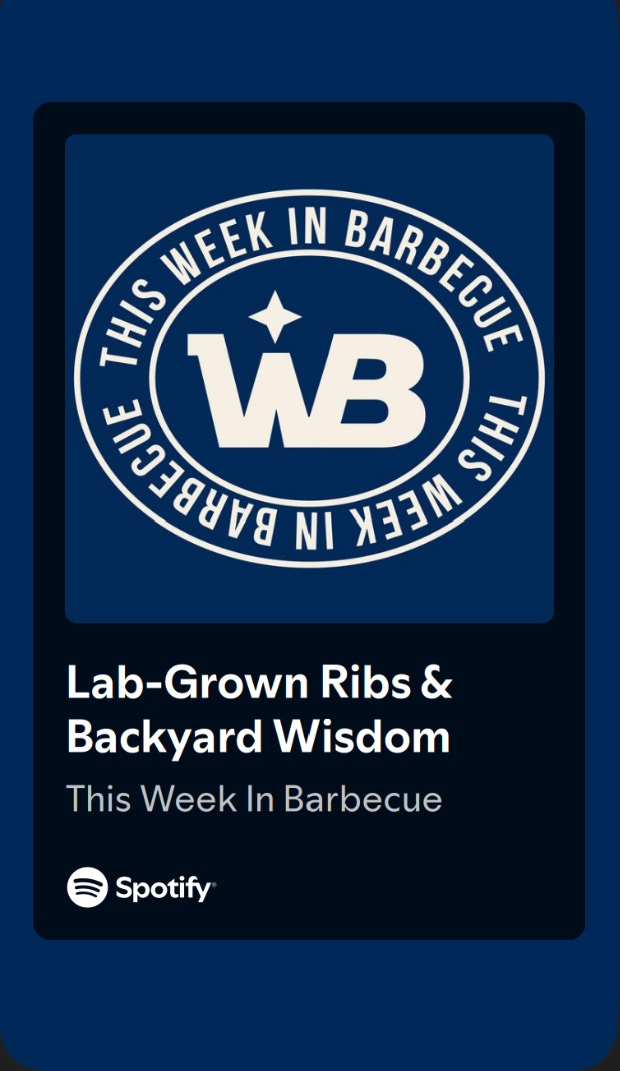Lab-Grown Ribs & Backyard Wisdom
We called it “Passed Down vs. Trained Up
In today’s BBQ world, you can scroll YouTube, enroll in a culinary program, or spend $400 on a brisket masterclass, but does any of that truly make you a pitmaster? Or does the soul of barbecue come from something deeper, something passed down?
That’s what we tackled on this week’s episode of This Week in Barbecue, sparked by two things: a lab-grown pork rollout in San Francisco and a beef market so expensive it’s got backyard cooks reaching for meatless Mondays. But beyond the price tags and protein substitutes, we asked ourselves: what makes great barbecue… great?
Let’s start with the science. Mission Barns in California just received regulatory approval to roll out lab-grown pork in restaurants. Think bacon made in a bioreactor, not a barn. Environmentally, it’s compelling, ethically it’s progressive, and if it tastes right… is it still que?
Now zoom out. Beef prices are up 12% from last year. One pound of ground beef? $6.12. Sales down nearly 15% YoY. For many families, barbecue, once a communal, affordable meal, is becoming a luxury.
So, how does this all tie together? It circles back to a deeper tension: innovation vs. tradition. Science vs. soul. The trained pitmaster with culinary credentials vs. the old head who seasons ribs with his eyes closed.
We called it “Passed Down vs. Trained Up.”
Passed Down: BBQ from the Back Porch
Barbecue, for many of us, was never measured in ounces. It was “season until the ancestors say stop.” It was watching Uncle Leroy flip ribs with one hand and hold a beer in the other. No timer. No thermometer. Just feel, instinct, and years of trial and error.
In this world, barbecue is a language spoken through smoke. A plate of ribs isn’t just food, it’s history, community, and celebration. Cookouts mark births, funerals, and family reunions. The knowledge isn’t written down. It’s absorbed.
These pitmasters don’t need validation. Their sauce recipes are whispered, not shared. Their fire techniques are sacred. Their goal? Feed people and make them feel loved.
Trained Up: Precision with a Side of Passion
But let’s not knock the new wave. Culinary school brings precision, consistency, and an understanding of food safety that’s vital, especially when you’re serving crowds.
These chefs know how long to rest meat down to the minute. They understand foodborne bacteria, humidity’s effect on smoke, and how to balance acid, fat, and heat. They can replicate greatness again and again.
Technique matters. You can’t pour soul into a brisket if you serve it undercooked or slice it wrong. And not everyone was lucky enough to grow up with a pitmaster in the family. For them, training is access.
Still, there’s one thing school can’t teach…
Can You Teach Soul?
Can you teach someone how to make a plate that feels like a hug?
Maybe you can teach technique. But soul, the kind that makes a stranger cry over a plate of collards or drive three hours for a rib tip, is earned. It’s in the smoke. It’s in the long hours. It’s in the little touches, the hospitality, the pride in putting your name on a plate.
We’ve all seen the “soulful BBQ” spots that play Marvin Gaye in the background and still serve dry chicken. Soul isn’t about playlist vibes. It’s about intention.
Our Takeaway
We need both.
Barbecue needs its elders and its apprentices. It needs the scientist and the storyteller. The GPS and the gut instinct. What matters is the respect for the process, the people, and the plate.
Whether your brisket comes from culinary school or your cousin’s back porch, just make sure it comes with care.
And hey, if lab-grown meat can make more tables accessible to great barbecue, we’re all ears, just don’t try to replace Uncle Boudreaux’s meat lotion. That’s sacred.



